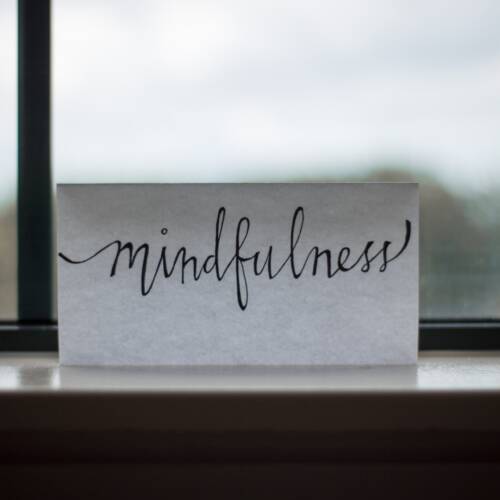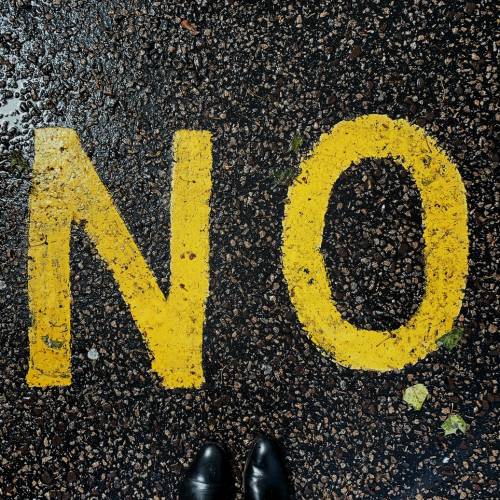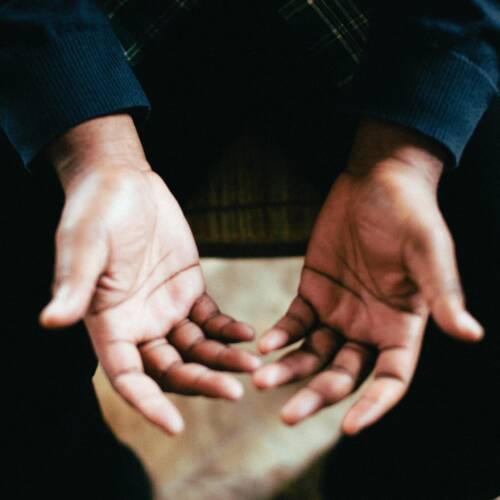
Is ‘No’ the Most Powerful Word in Faith?
25 Nov 2021Apparently ‘no’ was my first word. That doesn’t surprise me, given my adamancy as a young child on what I knew I did not want. As much as that would make for a funny story, in reality it became a point of contemplation for me over the years, on the sheer meaning of this word. If I were to ever struggle to assert boundaries, I would remember how toddler me seemed to know exactly how to do it. So, I began to learn, how truly embodying the word ‘no’ consists of much of the foundation of faith.
What role does the word ‘no’ play in how we practice our faith and ultimately live our lives? In line with negation, let’s first define what ‘no’ does not mean here. ‘No’ is not meant in regards to stubborn resistance, arrogance, rebellion, irrational eccentricity – all forms of ‘no’ that arise from an ego’s projection. ‘No’ in its healthiest form is simply a reference to what is now renowned in Modern Psychology as healthy boundary-setting; in Islam these are aligned to the boundaries which God Himself ordains and depicts. When ‘No’ is not carried out in its healthiest forms, one may become what they call a “yes man” – ultimately a person who stands for nothing, will fall for anything. When society at large cannot implement (or accept) healthy ‘nos’, we find ourselves living within an imbalance where it is very difficult for justice to co-exist, for life codes are not acted upon in alignment with the divine wisdom behind the intended relationship of balance between one’s soul and its interaction with the world.
‘No’ is in how a human being practices self-worth and its associated necessary boundaries – the divine worth granted to them by God, as they say ‘no’ to all the behaviours, concepts, theories, beliefs, practices that do not align to Him and His wish for us. In the journey of faith, one begins to say ‘no’ to the many self-imposed idols that become barriers to Him. One is required to say ‘no’ to the whims of their own greatest enemy – that which lies within – and through this are able to develop the self-discipline to prioritise God above else. By identifying and saying ‘no’ to one’s own weaknesses and whims, and by acknowledging one’s own faults, one is able to actively embark on a journey towards self-refinement. ‘No’ is powerful.
This is why, whilst psychology speaks of the power of the healthy ‘no’ in our lives regarding boundary-setting, Islam has been advocating it ever since its testimony of faith: La Ilaha illallah – there is No God but Him. La – meaning no, is the first word a Muslim utters in testifying faith – what could more aptly highlight its significance than this? It’s one of the first words uttered to a newborn child, and one of the last we ever hear as we are to be lowered into our graves. No: there is No God but Him. And with this ‘no’, comes the most powerful forms of negation in our lives, in order to enable a life that proves to our Lord, that truly He comes above all.
‘No’ is the very word your faith will be tested with. ‘No’ is the word that had Prophets and Saints mocked, slain, exiled and killed. ‘No’ is the most powerful form of resistance, when it exists within the chambers of a humbled believer’s soul, and manifests to the society around them. The process of detaching from the attachments which are devoid of God, in order to detach from the greatest idol of the Self. Ultimately it means a human must continually commit to saying ‘no’ to all the idols one recognises, as long as one’s intentionality aligns to Him, because there is No God but Him. Yet ‘no’ is not what will have you liked. ‘No’ is often a shape-shifting alteration to the status quo. Thus ‘No’ is the consistent element of standing up for faith that may even have one alienated, hence the test of doing so. But as they say: if you wish to find faith, you must first negate all that is false.
When I know to honour myself, is when I will say ‘no’ when I am tempted to sin. I will say ‘no’ to those who tempt me based on their own whims. I will say ‘no’ to what feels uneasy to my soul. I will say ‘no’ to toxic patterns. I will hear my conscience when it is telling me, ‘no’ must be said, in order not to empower wrong. I will listen to the voice in my heart, that tells me I am uncomfortable, and I will say ‘no’ in order to honour the God that is housed in the throne of my heart. I will say ‘no’ if I am treated with less than the worth God ordained to me. I will say ‘no’ when there are abuses of positions of power before Him. I will say ‘no’ to the social ills that distance me from Him. I will say ‘no’ to the devil, and to do that, I will first say ‘no’ to the devil in me. The one who temporarily enjoys you saying ‘yes’ to all that is immoral and wrong. For when you comply with the Self, you place barriers between you and Him, and herein faith becomes stagnant, and the nafs become increasingly bold and arrogant in its distance from Him.
I will say ‘no’ to the culture around me, even if it exists en masse, when its fundamental principles stand against Him. I will say ‘no’ when societal norms become a form of dominance in the place of religion. I will say ‘no’ to generational traumas that are guised as culture, and destroy the opportunities for a soul to choose God. I will say ‘no’ to immorality in the place of conscious principles. I will say ‘no’ to societal baggage that is devoid of the sincere, pure, and good will of faith, the simplicity associated to truth. I will say ‘no’ to the idols and shadows that are formulated in the form of image, which prevents the cultivation of a genuine, authentic relationship with God based on self-nourishment, acknowledgement and development.
I will say ‘no’ and keep saying ‘no’, because only then can I say ‘yes’ to God. For my yes belongs to Him, and a life that truly honours Him. This is demonstrated by the Prophet’s mission statement which began through the demolishing of idols. When Ibrahim sees the sun, moon and stars, He says ‘no’ as He realises these are not His God. When He realises the wrong of His kin and people, He says ‘no’. Musa says no to the ways of the Pharaoh despite his perceived power. Noah must say ‘no’ to his own wife and son. When He is accused of insanity for building an ark when no storm is in sight, He persisted on as He said ‘no’ to the shortsightedness of the people. As Yaqoob realises the deceit of his sons, He says ‘no’. When Yusuf is tempted by Zulaykha, He says ‘no’. When Maryam’s chastity is accused because of Her obedience to God, her silence with the people is her ‘no.’ When Zachariah raised Maryam in the temple despite the people’s slurs, He said ‘no’ to their limited thinking. Yet if we were truly to ask ourselves: when each of the honourable Prophets and Saints (peace be upon them), who are the epitomised examples of humanity for us, were in the process of saying ‘no’, how exactly were they treated?
“What are these statues to which you are devoted?” They said, “We found our fathers worshippers of them.” He said, “You were certainly, you and your fathers, in manifest error.” They said: “Have you brought us the truth, or are you one of those who play about?” He said, “[No], rather, your Lord is the Lord of the heavens and the earth who created them, and I, to that, am of those who testify.” [Surah Fussilat 41:52 to 56]
The honour of saying ‘no’ does not come from people – many times, it will offend people. And that’s exactly when you must keep finding the courage to say ‘no.’ Can you say ‘no’, even when it personally costs you? It is then that you have exhibited true belief. When people choose not have the capacity to stand up and say ‘no’, also witness another individual saying ‘no’, a form of Crowd Psychology and Herd Behaviour begins to manifest, as demonstrated in the above verse. Due to the illusion of their numbers, it is easy to project their insecurities towards change as a seeker of God dares step outside the crowd: and this is why the Prophets were accused of madness, stubborn resistance, arrogance, rebellion, irrational eccentricity. For saying ‘no’ to the way things always were. The very ‘no’ that created earthquakes beneath people’s feet as the status quo changed to Tawhid time and time again. La Ilaha Illallah… because truly testifying There Is No God But Him, begins with saying no more to all that falsely and ignorantly existed for far too long in His place.
He (the father) said: “Do you reject my gods, O Ibrahim (Abraham)? If you do not stop (this), I will indeed stone you. So, get away from me safely before I punish you.” [Surah Maryam 19:46]
“O fire, be coolness and safety upon Abraham.” [Surah Al-Anbiya: 21:69]
When Allah instils na-Mahram boundaries, we are taught from the offset, we live in a paradigm where the ‘no’ is honoured in Islam. When we are taught to say ‘no’ to the sins which formulate barriers between us and Him, it is an honour. Being a follower of Muhammad al Mustafa (s) and saying ‘no’ to the many societally imposed idols, no matter the price, is an honour. Yet ‘no’ is not always meant to be dictated in a blunt nor offensive way, it has many manifestations that depends on the applying of wisdom in each situation circumstantially. The purpose of ‘no’ is never to be disruptive to others, but rather to align to God’s peace within. It is the establishment of one’s own Tawhid. Sometimes ‘no’ is an elongated process enshrined in patience. Other times, it can be saying “peace” to ignorance and choosing not to engage. At times it can be silence, and sometimes it can be “to you your religion, to me mine.” ‘No’ comes in its many forms.
However you choose to say ‘no’, God will keep trialling you and honouring you in proportion to your ‘nos’ and how they take you closer in proximity to Him. Yet in the Qur’an we find the many reasons people never found the courage to say ‘no’ in order to succeed in their own tests. It is easy saying ‘no’ outwardly and when en masse. It was always difficult to say ‘no’ to the issues that personally affected them – their own traditions, to their own lifestyles and habits, to their forefathers, to the way of their families, to the way of those deemed socially elite. To those in power positions that would compromise their own feeling of strength. Because of fear, because of stagnancy, because of a desire for things of the world, because of image, because of a yearning for short-term comfort as opposed to the eternal bliss that will surely come despite the discomfort of saying ‘no’. Because the instant gratification of people and their customs is far easier than attaining the pleasure of the Lord of the unseen. ‘No’ comes with its baggage in this world – but the negation of all that stands as a veil between you and Him, comes with the honour of attaining God Himself.
“Then, We have inspired you (O Muhammad): “Follow the religion of Ibrahim (Abraham) (Islamic Monotheism – to worship none but Allah)”, [Surah An-Nahl 16:123]
Because to have the courage to say ‘no’, you truly have to believe in the unseen. You are prioritising the Lord who is not visible through the eyes, not possible to hear through the ears, not possible to feel with the touch. You are silencing all these bodily senses, in exchange for the vision of the heart. The conscience that feels it loudly and clearly when a boundary of ‘no’ should be there. The heart that in its very essence, was created to sing the praise: La Ilaha Illallah, in continuity and synchronicity with every atom of the universe knows when it needs to say ‘no’. Its understanding of morality is tied to its conscience, yet the more we are unable to say ‘no’ to all that is wrong, the more we are also unable to advocate for what is right as we increasingly darken and silence the heart.
“Had it been a near gain (booty in front of them) and an easy journey, they would have followed you, but the distance was long for them; and they would swear by Allah, “If we only could, we would certainly have come forth with you.” They destroy their own selves, and Allah knows that they are liars.” [Surah Tawbah 9:42]
Yet your heart was given the freedom to exercise the beauty of its free will, in order to truly honour itself. And to honour itself, it learns: the power of its ‘no’ is the beginning of everything else, as illustrated by the many stories of the Quran pertaining to the establishment of faith through each generation. Because He Himself is the beginning and end. ‘No’ is hard at first. But take one step to Him, and He will run towards you. Because saying ‘no’ to our own inner, as well as, societal veils is merely the means to saying ‘yes’ to Him. ‘Yes’ to all things beautiful is often proceeded by ‘no’ to all that is not.
So truly: No – there is No God but Him. La ilaha illallah is an anthem for the free hearts who know the journey of one’s faith merely begins by recognising one’s soul… and saying no more where ‘no’ is necessary. To let go of your fears and say ‘no’. It is then that God shows us, there is nothing to fear. Fear too is an idol. Because No, there is no other God that should possess and control the heart, the mind, the soul and its free will – other than Him.
“Such is Allah, your Lord; there is no god but He, the Creator of all things; so, worship Him (and Him alone), and He has charge of all things” [Surah al An’am 6:102]















